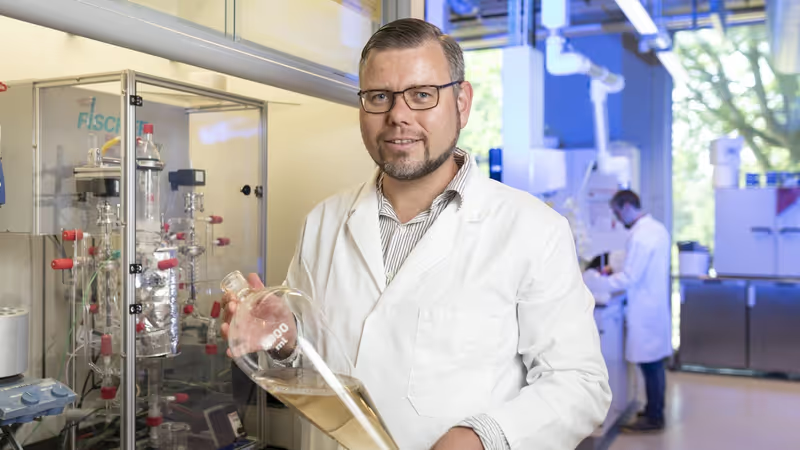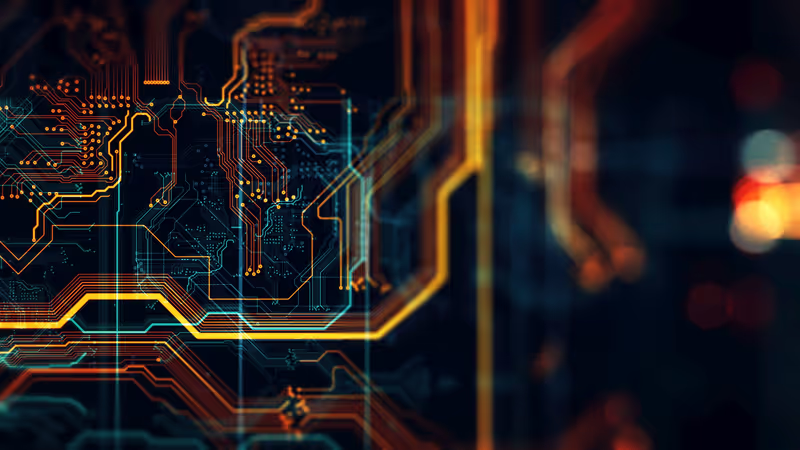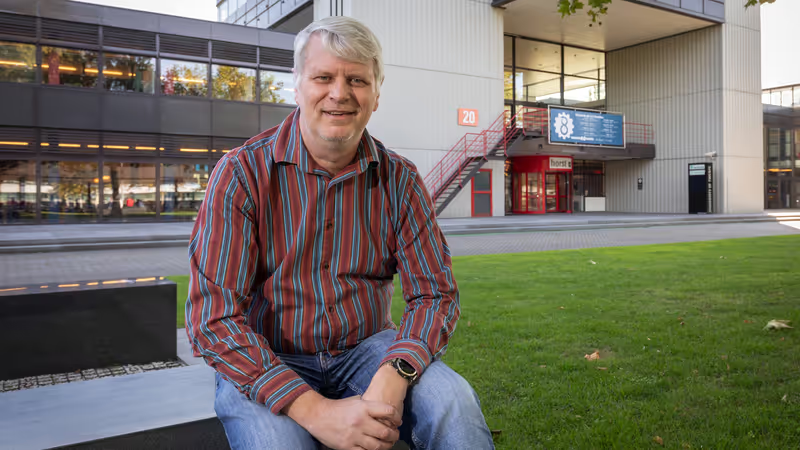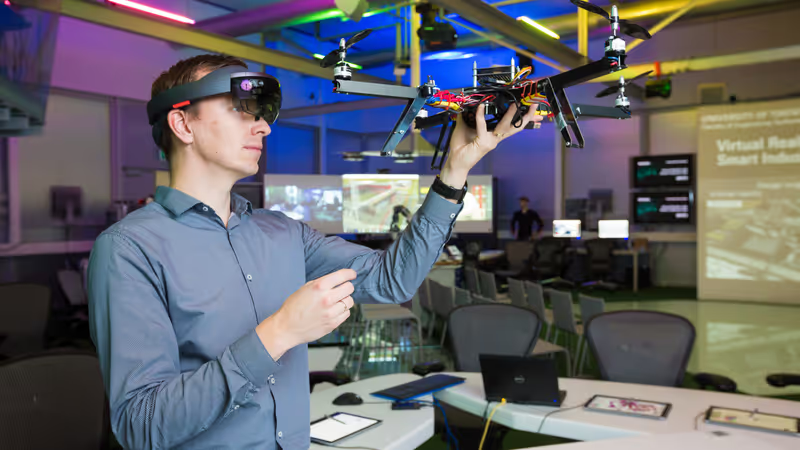Al sinds de prehistorie zoeken we naar nieuwe manieren om voorwerpen te maken.
De uitputting van natuurlijke hulpbronnen dwingt ons vandaag de dag om verspilling tegen te gaan en een circulaire economie te creëren. Tegelijkertijd eisen we als consumenten betere, goedkopere en gepersonaliseerde producten, on demand bezorgd via snelle en flexibele productie- en bezorgsystemen. En vraagt de industrie om efficiëntere productie, voorspellend onderhoud, slimme materialen en nieuwe verdienmodellen. Voorheen op zichzelf staande fabrieken en ketens smelten samen in zogeheten Intelligent Manufacturing Systems, die ongekende veranderingen teweeg brengen in het industriële landschap.
Onze wetenschappers en hun onderzoek
Als ingenieurs, computerwetenschappers, wis- en natuurkundigen samen met materiaal-, productie- en supply chainspecialisten oplossingen zoeken, kunnen de resultaten voor de maakindustrie verbluffend zijn. Lees de sneak previews van het nieuwe maaktijdperk:
Vier cruciale onderzoeksgebieden
De Universiteit Twente is een koersbepalende, internationale speler in het groeiende speelveld van Intelligent Manufacturing Systems. Onze universiteit blinkt uit in een aantal domeinen en onderliggende wetenschappelijke disciplines die essentieel zijn voor verdere groei op dit gebied:
Additive Manufacturing (AM) is one of the game changers in the 4th industrial revolution. Current research themes within AM include process modelling and optimization, development of AM processes for new materials, development of AM processes for multi-material applications (metal/plastic, metal/ceramic), development of AM processes for very large parts, new AM based models for product design and AM process and product certification.
Integrated sensors and control play a crucial role towards zero defect manufacturing. Sensors provide a huge amount of data, which has to be mined, processed and translated to control and advance the manufacturing process. Variation in, e.g., material and process conditions can be measured in-line and directly corrected based on advanced nonlinear process models. Research in this area focuses on nonlinear process (chain) modelling, robust optimization and model-based control.
In Industry 4.0 scenarios, smart robots will take on a range of production tasks (production, inspection, transportation) and will behave as smart production entities based on local intelligence that react to data from sensor-rich production environments. Current research focusses on decentralized and mixed control strategies that will enable maximal flexibility and extensibility of systems of cooperating production robots.
Maintenance is vital in ensuring the availability, reliability and cost-effectiveness of technical systems. The research field ranges from physics of failure (failure modelling, life prediction) and structural health and condition monitoring to data analysis, maintenance process optimization and logistic challenges in resource planning. The key challenge is to transfer fixed time interval maintenance to on-demand, remote operated maintenance strategies.
Digital Twinning means that each physical device and process will have its cyber part as a digital representation of the real world for the whole life cycle of a product or process. The ‘digital household’ consists of a ‘digital parent’ that captures the nominal type definition of the cyber-physical system and digital twins that represent one or more instantiated products.
Process and product development are organised in cycles. The structuring, management and the accuracy, applicability and reliability of information are of crucial importance for the efficiency and effectiveness of these development cycles. The development cycles of products and processes, combined with the different stakeholders/perspectives that are involved at different levels of aggregation are so complex, that virtual models are required to provide the essential understanding for optimal product and process development. Research on all levels is carried out to allow for building full-blown Digital Twins.
The relevant topics for research related to modeling, analysis, design and internet-based ICT for smart industries are sensor design, with (wireless) sensor networks to monitor production processes and products; Internet-enabled decentralized monitoring and control algorithms that improve product and production-process performance; machine-learning algorithms and (big) data analytics for industrial processes; effective, reliable, and secure data collection and sharing; proactive maintenance strategies using local and global information; improved supply-chain management techniques, utilizing data acquired locally and globally; self-optimizing (industrial) systems; autonomic systems; cloud-based generic services that enable the transfer to smart industries; dependability, security, and privacy issues of the internet-of-things; ICT’s impact for smart industries on industry structures and value chains; and application-specific research, including (but not limited to) smart grids, production, transportation systems, and infrastructure.
A cyber-physical system (CPS) is a system featuring a tight combination of, and coordination between, the system’s computational and physical elements, and the system’s environment. The CPS research focuses on the design and implementation of communicating computational elements (both hardware and software for both communication and computation), taking into account the foreseen interaction with a physical environment and driven by application constraints. To integrate networking, computation and physical processes, wireless networked systems for sensing and control are of key importance. Research ranges from radio transmission systems, and wireless network systems to sensing and control, always in close connection with the (extremely demanding) applications.
Cyber Security and Public Safety aim to make physical and cyberspace safer by combining the forces of ICT and social sciences, in particular psychology, sociology, and philosophy, in order to design high-tech solutions tuned to human behaviour and needs. ICT will provide the technology to detect risks and abuse and protect against these. Social sciences will help to understand the behaviour of users and (potential) offenders in order to design technology that is effective, efficient and proportional.
Global supply chains and business networks will be continuously redesigned driven by ICT innovations. Sensor networks start to deliver a wealth of (near) real-time data from distributed sources. No longer dependent on rough estimates, the industry can start to use big datasets to analyze current performance and future alternatives. Businesses that do not have the agility to transform their ICT architecture, processes, products and services quickly lose their competitive edge.
Disturbances in the supply chain have to be tackled at the three production levels, i.e., production network, plant and shop-floor levels, thus covering the strategic, tactical and operational decision-making levels. As disturbances propagate from one level to another, proper coordination mechanisms are required to manage the supply chains robustness. Methods and computer tools are developed for quickly setting up new supply chain configurations. These tools will determine and implement new production schedules as soon as changes in supply chain configurations are occurring. This will increase the level of coordination among suppliers and producers by information sharing protocols and contracts, and changing planning directly as system disturbances appear. Driven by the concept of equipment re-use, reconfigurable and co-evolving production cells can be implemented.
Sustainable Supply Chain Innovation (SSI) focuses on the design and implementation of sustainable innovation of global supply chains. SSI is achieved by enhancing and implementing ICT, operations and coordination methods for planning and control, and organisational theories in complex multi-actor settings. Methods include algorithm design, large-scale simulations, serious games, architecture modelling and distributed systems engineering.
Smart Industry challenges the validity of established business models. Increasing customer/market orientation and the resulting problems of varying diversity and product complexity correlates to the complexity of business processes in manufacturing companies. The speed of corporate reactions towards changes to obtain or maintain a stable process situation depends on the product and process transparency. The management of complexity in product and processes as well as the decentralization in case of smart factories is a real future challenge. To successfully combine the use of new production technology, digitization and a network approach, firms are challenged to adapt the four interlocking elements of their business model, i.e., customer value proposition, profit formula, key processes and key resources.
The establishment of a network-centric production system that spreads throughout the entire asset lifecycle may cause the emergence of new forms of collaborations that are characterized by a co-creation approach to value creation. Among the collaboration partners, customers play a predominating role. They become an integral part of the smart industry by providing information on their individual needs – a critical input for optimizing existing and creating new network-centric production systems. Some key research lines are the design and implementation of new business models that allow the active integration of customers, to evolve business models into efficient and effective mechanisms based on co-creation competences, customer intimacy within an information-based business approach and the contribution of co-creation approach to the creation of customer intimacy.
Smart Industry is on the agenda of many countries, hence, managing inter-company relationships in coopetitive settings, i.e., contexts in which competition and cooperation merge together, has to be advanced. Since competition and cooperation might not be considered as secluded spheres, the development and adoption of new technologies required for smart industry solutions (e.g., automation, digitization, flexibilisation, etc.) might benefit from a network approach to innovation among various competitive firms. Therefore, key questions to be asked are: How to promote the establishment of coopetitive settings to foster the development of a smart industry? How can coopetitive competences help business models to evolve into efficient and effective mechanisms of value creation within a smart industry? How do coopetitive settings impact the technological advancement and adoption of technological standards within a smart industry? How can firms benefit from the pursuit of coopetition strategies?
Cross-disciplinaire aanpak
Het samensmelten van onderzoeksgebieden in dit thema is in onze ogen de sleutel naar de ontwikkeling van Intelligent Manufacturing Systems. Onze cross-disciplinaire manier van denken en werken maakt dat we bij kunnen dragen aan hele nieuwe concepten en productie-ecosystemen.
Samenwerking
De Universiteit Twente beschikt over state-of-the-art faciliteiten die veel mogelijkheden bieden voor samenwerking op het gebied van onderzoek en onderwijs. Bedrijven kunnen bijvoorbeeld een samenwerking aangaan met de UT voor productonderzoek of testen in een windtunnel. Het contact voor samenwerking is Timo Meinders.
DE UNIEKE ROL VAN HET FRAUNHOFER PROJECT CENTER OP DE UT Fundamenteel wetenschappelijk onderzoek en pasklare oplossingen voor actuele en zeer complexe industriële uitdagingen: het gerenommeerde Fraunhofer Instituut brengt de twee bij elkaar. Met 69 centra wereldwijd, stuk voor stuk gekoppeld aan een universiteit en een naburige industriële regio, is het instituut Europa’s leidende instelling voor toegepast wetenschappelijk onderzoek.
‘Wij creëren een gouden cirkel van wetenschap, industriële toepassing en sociaaleconomische vooruitgang,’ zegt Biba Visnjicki directeur Business Development van de Twentse loot aan de tak, het Fraunhofer Project Center in Enschede. ‘Wij hebben maar één kernactiviteit: het telkens vinden van nieuwe manieren om relevante wetenschappelijke kennis om te zetten in industriële oplossingen waar de economie en de maatschappij als geheel profijt van heeft.’
In Nederland werkt het instituut met slechts één universiteit samen: de Universiteit Twente (UT). ‘Een logisch keuze,’ aldus Visnjicki. ‘De UT is in Nederland de enige universiteit met een sterke focus en een toonaangevende rol op het gebied van productie en de maakindustrie. Met onderzoek op terreinen die uiteenlopen van non-conventionele productietechnieken, data science en cyber security tot psychologie, management en organisatie heeft de UT alle expertisegebieden in huis waarmee we de industrie van morgen kunnen vormgeven. Daarnaast is de regio Twente met veel eerste- en tweedelijns maakbedrijven absoluut de sterkste Nederlandse regio in advanced manufacturing. Er is bovendien veel groeipotentieel en een dringende behoefte aan wat wij bieden.’
De meest brandende vraag in de maakindustrie op dit moment, volgens Visnjicki, is deze: Hoe kan de industrie al die data die ze inmiddels verzamelt met behulp van sensortechnologie – over producten, processen, ketens en markten – gebruiken om slimmer te produceren? Visnjicki: ‘Een universiteit als de UT beschikt over diepgaande kennis die essentieel is voor het vinden van antwoorden op deze vraag. Maar de industrie heeft haast. Onze taak is niet om wetenschappers op te jagen of te veranderen in verkopers van oplossingen. En ook niet om industrieën te vertellen dat ze geduld nodig hebben. Wat we wel willen en doen is het slaan van creatieve bruggen tussen de twee. Met als vast uitgangspunt een concrete klantvraag, zetten wij samen met onze collega’s van Fraunhofer IPT extra middelen en mensen in – bijvoorbeeld masterstudenten, postdoctorale onderzoekers of projectteams – om het wetenschappelijke veld te doorzoeken naar relevante kennis en om die in samenwerking met de industrie om te zetten in werkende oplossingen. Het mes snijdt aan twee kanten, want de industriële toepasbaarheid van kennis geeft weer richting aan nieuw wetenschappelijk onderzoek en prikkelt wetenschappers en studenten na te denken over de vragen van morgen en overmorgen. Het is een gouden cirkel.’
Actualiteiten binnen dit thema
Meer nieuwsartikelen
Spinoffs
Voor de vierde keer op rij zijn we benoemd tot de meest ondernemende universiteit van Nederland. We zijn succesvol in het vertalen van ontwikkelde kennis naar economische bedrijvigheid: ruim duizend spinoffs hielpen we opstarten. Onderstaand een aantal voorbeelden:
Opleidingen
Naast onze onderstaande bachelor- en masteropleidingen, bieden we aanvullend onderwijs op het gebied van INTELLIGENT MANUFACTURING SYSTEMS
Contact
Geïnteresseerd? Neem contact op met Timo Meinders




